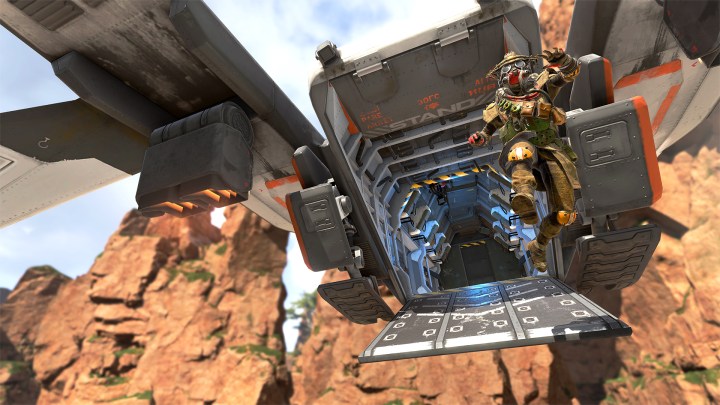
Apex Legends was a surprise hit to my free time. I didn’t even know it was coming. Then, suddenly, it was all I could play.
My binge, as always, was accompanied by a glance at the backlog of games I’ve acquired over the years, and I can’t help but feel a bit of sadness. As much as I like to tell myself I’m going to eventually play through the entire Witcher or Dragon Age series, I know I almost certainly won’t. I will never get around to playing beloved games I missed out on because today’s biggest games demand constant attention.
Apex Legends, Anthem, and The Division 2 are different in many ways. Yet they all have one thing in common — they’re ‘live service’ games. Always online and continuously evolving, live service games have the ability to persist for years using seasonal content updates, micro-transactions, paid subscriptions, and regular adjustments to the meta-game. It’s a revenue model that’s now in favor, much to the dismay of everyone with a gaming backlog.
A case of massive FOMO
The most well-known (though hardly the first) of the live service bunch is Fortnite. Just hearing the name of that game exhausts me. With every new season comes new events, modes, and exclusive skins. Worse (or better?) yet, each week arrives with a new set of challenges. That sounds like a lot of content for a free-to-play game, right?

Ah — but the game can feel limited unless you purchase a seasonal Battle Pass. That unlocks the full breadth of Fortnite’s challenges and rewards. Want that legendary skin they debuted at the start of the season? Better get yourself a Battle Pass, complete every week’s challenges, and climb up the season’s 100 tiers.
It’s no wonder we keep seeing this live service model implemented in other games.
That is a lot of time to commit to a game. Fornite has managed to grow and keep its player base since its launch in September 2018. That’s what Epic wants, and it continues to make money. It’s no wonder that we keep seeing this live service model implemented in other games.
And Fortnite is just the tip of a huge iceberg. Soon, we’ll be getting both Anthem and The Division 2, two huge games that will have seasonal content and free DLC, placing a massive bounty on my free time. I could be progressing my Dragon Age: Inquisition campaign, but why would I do that when my entire Discord is playing the newly released (and fantastic) Apex Legends?
Striking a balance (or, who am I kidding?)
Every time I add a new game to my backlog, it comes with an asterisk — “If you play this game now, you’ll probably never finish it.” I’m too damn distracted. It seems every game is begging me to abandon my interest in everything else.

Case in point: Fallout 76. Fallout has traditionally been a single-player series, and then Bethesda shows up, rubbing its hands together with an always-online, multiplayer prequel, sending fans into a downward spiral. Mostly because its launch was really bad — but the game has so much potential and, once again, demands the all your free time.
Every game I add to my backlog comes with an asterisk — “If you play this game now, you’ll probably never finish it.”
Red Dead Redemption 2 has a similar, though much more polished, problem. Finishing the long campaign funnels you towards Red Dead Online, fit with cooperative missions and online modes that included a battle royale called Gun Rush. You could buy the game and not play another for a year.
There are many more examples and any of them has the potential to rope me in for the long haul. While there’s still plenty of games that aren’t trying to buy up all of my free time, I’m wondering how long that will last.
I know I’m not the only one struggling to keep up. Eventually, people will have to prioritize the games they want to make time for and drop the ones they don’t. This leads to more people investing lots of time in fewer games.

Financial reports from last year have shown that Fortnite and Call of Duty: Black Ops 4 had incredible success, while many competitors didn’t do so hot. The exact reasons for this trend are unclear, but signs point to games like Fortnite.
Following the release of Apex Legends, Fortnite’s viewership on Twitch saw a significant decline. Of course, this is largely due to streamer’s shifting their focus on the new and popular game, but this will likely influence many of their viewers to do the same. If Fortnite, gaming’s long-time darling, is taking a hit, I can only imagine what this means for upcoming titles.
It seems possible players just won’t have time even for high-profile releases.
Where do we go from here? I’m not sure. To me, it seems clear the shift to live service everything is way too much for everyone. If games like Anthem and The Division 2 prove to be a success, despite all the noise, then maybe I’m wrong.
But it also seems possible players just won’t have time for even these high-profile releases. The mild response to the Anthem demo shows how hardened audiences have become. Many gamers seem more than okay with sticking to what they know, unless a new release is of absolute top-tier quality.
Until then, my backlog of games will continue to collect dust. I’ll be too busy with Apex Legends.


